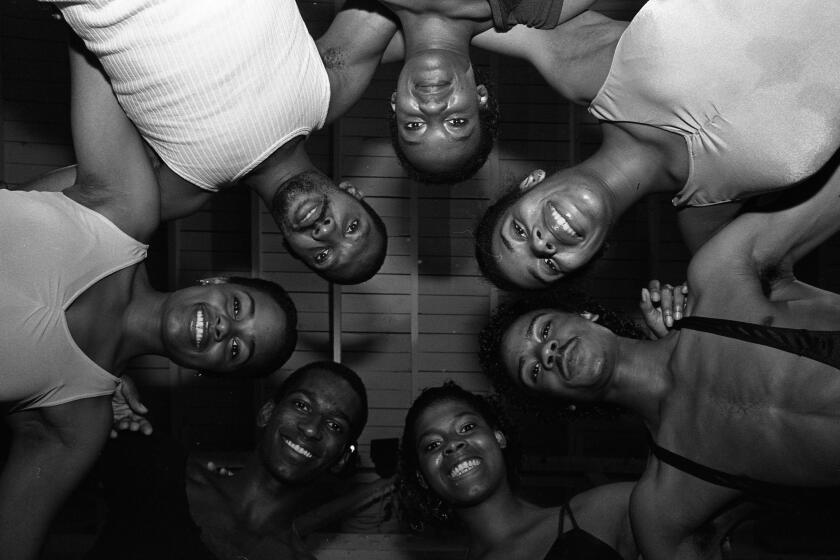Voices of Black Los Angeles: She’s in control but Is more fragile than she appears
- Share via
This story originally ran in 1982 as part of the “Black L.A.: Looking at diversity” series. We have preserved the original text in order to provide an accurate account of the work in print.
Catherine, 26, commands attention. It could be her crimson-and-purple miniskirt. But more than likely it is what writer Maya Angelou describes as “the reach of my arms, the span of my hips, the stride of my step, the curl of my lips.” A large-boned, athletic woman who roller skates and plays racquetball, Catherine is a cocktail waitress in a popular local club.
She works for a boss she describes as “sometimes a lunatic,” so she asked that she not be fully identified. She likes her job, she said, “because I’m very good at what I do and I like being around interesting, well-dressed people ... and the men aren’t bad either.”
When told that she would be treated to lunch, she ordered two full lobster tails, the best and most expensive item on the menu, without hesitation. When men stuck their heads out of car windows to coo, “Hey, mama can I go with you?” she smiled and waved them off. But the wave was just a caution signal not a final stop sign. No china doll this woman but she is more fragile than she appears.
“One thing you can’t do is let people intimidate you. If they do intimidate you, you can’t let them know it. I’ve learned that in cocktail waitressing.
“But right now I’m involved in school and I can’t wait to finish so I can move on. My mother’s still working. My father’s retired now. He sold flowers. A lot of people think that’s menial. But you know, he raised three kids and we never wanted for anything.
Friends think of marriage
“A lot of my friends are thinking about getting married and having kids. They really want to. A lot of them are five to six years older than me and they’re worrying about it. I think a lot of it is conditioning. I want to take care of myself. I don’t want to be one of those women who, if you touch me, I’ll break. I’m not like that. I think men respect women who know their own heads, that can take care of themselves.
“Men is singles bars think, ‘If she’s a cocktail waitress, she must be into crazy times, men, drugs.’ And then they think if a woman doesn’t want them, there’s got to be something wrong with her. Ha!
In the summer of 1982, The Times published a series on Southern California’s Black community called “Black L.A.: Looking at Diversity.”
“I don’t go through life thinking, ‘I’m black, I’m black, I’m black,’ you know? But my boss sometimes makes me very, very aware that I am black — with those funny little white jokes. In talking to me he starts using the phrase, ‘you people,’ or he imitates a ghetto-type man, saying ‘Hey, blood.’
Once I called him a bigot and he got very upset — he doesn’t even know he is! He denied it and said, ‘If you think I’m a bigot, you’d better keep it to yourself.’ I said, ‘That’s all right, I don’t have to tell anybody else. They already know!’ When he lets me do my job the way I do it best and I follow the club rules, everything goes fine.
“Sometimes ... sometimes I feel very, very lonely. Sometimes I even cry, and I really don’t know why. My ex-boyfriend used to tell me I set my standards too high. I don’t think you can ever set your standards too high. ... I just want fulfillment. I don’t want to be real rich, rich, rich. I want to be comfortable; I want to make somebody comfortable. I just want to be able to smile.”



